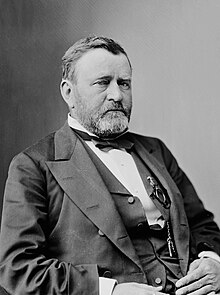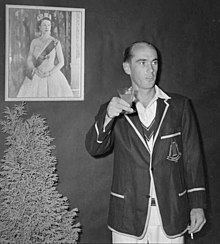Portal:History
The History Portal

Historia by Nikolaos Gyzis
History is the systematic study of the past. As an academic discipline, it analyzes and interprets evidence to construct narratives about what happened and explain why it happened, focusing primarily on the human past. Some theorists categorize history as a social science, while others see it as part of the humanities or consider it a hybrid discipline. Similar debates surround the purpose of history, for example, whether its main aim is theoretical, to uncover the truth, or practical, to learn lessons from the past. In a slightly different sense, the term history refers not to an academic field but to the past itself or to individual texts about the past.
History is a broad discipline encompassing many branches. Some focus on specific time periods, such as ancient history, while others concentrate on particular geographic regions, such as the history of Africa. Thematic categorizations include political history, social history, and economic history. Branches associated with specific research methods include quantitative history, comparative history, and oral history.
Historical research relies on primary and secondary sources to reconstruct past events and validate interpretations. Source criticism is used to evaluate these sources, assessing their authenticity, content, and reliability. Historians integrate the perspectives of several individual sources to develop a coherent narrative. Different schools of thought, such as positivism, the Annales school, Marxism, and postmodernism, have distinct methodological approaches.
History emerged as a field of inquiry in the ancient period to replace myth-infused narratives, with influential early traditions originating in Greece, China, and later also in the Islamic world. Historical writing evolved throughout the ages and became increasingly professional, particularly during the 19th century, when a rigorous methodology and various academic institutions were established. History is related to many fields, including historiography, philosophy, education, and politics. (Full article...)
Featured picture
Did you know (auto generated)

- ... that pianist and composer Josef Weiss created the first film score in the history of German cinema?
- ... that Chris Wroblewski was the starting point guard for the winningest team in Ivy League history?
- ... that history sniffing has been used to track Papa John's customers?
- ... that Fernando Cajías, who belongs to the first generation of professional historians in Bolivia, composed part of history academia's "Mirista wing"?
- ... that no one laughed at the worst joke in legal history?
- ... that during the early-access period of Hogwarts Legacy, the game set a new record on Twitch with the largest number of concurrent viewers for a single-player game in history?
Ian David Craig OAM (12 June 1935 – 16 November 2014) was an Australian cricketer who represented the Australian national team in 11 Tests between 1953 and 1958. A right-handed batsman, Craig holds the records for being the youngest Australian to make a first-class double century, appear in a Test match, and captain his country in a Test match. Burdened by the public expectation of being the "next Bradman", Craig's career did not fulfil its early promise. In 1957, he was appointed Australian captain, leading a young team as part of a regeneration plan following the decline of the national team in the mid-1950s, but a loss of form and illness forced him out of the team after one season. Craig made a comeback, but work commitments forced him to retire from first-class cricket at only 26 years of age.
A teenage prodigy, Craig made his first-class debut for New South Wales in the last match of the 1951–52 Australian season, aged only 16. The following summer, Craig earned comparisons to Don Bradman, generally regarded as the greatest batsman of all time, after becoming the youngest player to score a first-class double century, an unbeaten 213 against the touring South African team. The innings secured Craig's Test debut in the final match against South Africa, making him the youngest male player to represent Australia in a Test, aged 17 years and 239 days. Craig started his Test career well, scoring 53 and 47 to ensure his selection for the 1953 Ashes tour, making him the youngest Australian player to tour England. Craig's arrival precipitated media comparisons to the arrival and success of Bradman in 1930, but he performed poorly and was not selected for any of the Tests. (Full article...)
On this day
- 1891 – Frances Coles was killed in the last of eleven unsolved murders of women that took place in or near the impoverished Whitechapel district in the East End of London.
- 1961 – Geode prospectors near Olancha, California, discovered what they claimed to be a 500,000-year-old rock with a 1920s-era spark plug encased within (pictured).
- 2017 – Kim Jong-nam, the half-brother of North Korean leader Kim Jong Un, was assassinated using VX nerve agent in Kuala Lumpur, Malaysia.
- Muhammad ibn Ra'iq (d. 942)
- Isabella d'Este (d. 1539)
- Dorothy Bliss (b. 1916)
- Balu Mahendra (d. 2014)
Selected quote
"Strike an enemy once and for all. Let him cease to exist as a tribe or he will live to fly in your throat again".
— Shaka, 19th century Zulu king
Related portals
More Did you know...
- ... that on 26 April 1881 HMS Doterel (pictured) exploded, killing 143 of the 155 crew members?
- ... that causes of the deaths at the Berlin Wall included shooting, drowning, suffocation, suicide, and falling from a balloon?
- ... that the 19th-century swindler Bertha Heyman, known as "The Confidence Queen," conned men by pretending to be a wealthy woman who was unable to access her fortune?
- ... that only four great uncial codices have survived until the present day?
- ... that after World War II, Polish resistance organizer and Warsaw Uprising fighter Jan Mazurkiewicz was brutally tortured by the authorities in communist Poland?
- ... that tiny Paederus beetles may have caused some of the ten Plagues of Egypt?
- ... that the only known report of bloodshed during the simulated Nazi invasion of Winnipeg was from a woman who cut her thumb while preparing toast?
- ... that Dacian bracelets were used as currency and votive offerings?
Topics
Categories

History • By period • By region • By topic • By ethnic group • Historiography • Archaeology • Books • Maps • Images • Magazines • Organizations • Fictional • Museums • Pseudohistory • Stubs • Timelines • Chronology • People • Wikipedia historians
WikiProjects
![]() WikiProject History •
Ancient Near East • Australian History • Classical Greece and Rome • Dacia • Former countries • History of Canada • Chinese history • European history • Heraldry and vexillology • Indian history • Jewish history • Medieval Scotland • Mesoamerica • Military history • Middle Ages • History of Science
WikiProject History •
Ancient Near East • Australian History • Classical Greece and Rome • Dacia • Former countries • History of Canada • Chinese history • European history • Heraldry and vexillology • Indian history • Jewish history • Medieval Scotland • Mesoamerica • Military history • Middle Ages • History of Science
WikiProject Time • Days of the Year • Years
WikiProject Biography • Composers • Political figures • Saints • United States Presidents
Things you can do
 |
Here are some tasks awaiting attention:
|
Associated Wikimedia
The following Wikimedia Foundation sister projects provide more on this subject:
-
Commons
Free media repository -
Wikibooks
Free textbooks and manuals -
Wikidata
Free knowledge base -
Wikinews
Free-content news -
Wikiquote
Collection of quotations -
Wikisource
Free-content library -
Wikiversity
Free learning tools -
Wiktionary
Dictionary and thesaurus























































